Entrevistamos a Theo Lawrence que realizará este mes de mayo su gira más extensa por nuestro país compuesta por 12 fechas para presentar «Chèrie» lanzado el pasado mes de febrero. Tercer disco del francés grabado en los estudios Fort Horton Studios en Texas junto a su banda The Possums con Ripault a la guitarra, Bastien Cabezon batería, Olivier Viscat al bajo, Julien Bouyssou al piano e instrumentos de cuerda por John Schattenberg.
El músico franco-canadiense al que vimos por primera vez en nuestro país en aquella gira el pasado mes de diciembre de 2021 y el pasado verano en el Azkena Rock Festival vuelve a sorprendernos con su primer sencillo del próximo nuevo álbum. Sus canciones siempre se han arraigado en la música de raíces estadounidenses. ‘Liquor & Love’ es una balada romántica con sutiles arreglos de cuerdas y voces convincentes, que te transporta a los tiempos de Roy Orbison y Frank Sinatra.
Fechas de la gira española de Theo Lawrence 2023:
- 12 mayo en Zaragoza, Rock & Blues Café
- 13 mayo en Madrid, El Sol
- 14 mayo en Granada, Planta Baja
- 15 mayo en Sevilla, Sala X
- 16 mayo en Valencia, Loco Club
- 18 mayo en Santander, Little Bobby
- 19 mayo en Santiago de Compostela, Riquela
- 20 mayo en Avilés, Factoría Cultural
- 21 mayo en Donosti, Dabadaba
- 23 mayo en Bilbao, Kafe Antzokia
- 24 mayo en Gerona, La Diva
- 25 mayo en Barcelona, La Textil
Entrevista a Theo Lawrence, gira 2023:
Hopa Theo, ¿Qué tal estás, preparado para una nueva gira por nuestro país compuesta para una docena de conciertos este mes de mayo?
¡Estoy más que preparado! ¡Tenía muchísimas ganas de empezar mi próxima gira española! ‘Cowboy’ Jack Clement dijo una vez: «Estamos en el negocio de la diversión. Si no te diviertes, algo estás haciendo mal». Y te digo una cosa – ¡nosotros vamos a hacerlo bien! jajaja Este año, he echado mucho de menos girar con la banda completa. Esta gira significa que estamos oficialmente de vuelta, haciendo lo que más amamos.
En tu primera gira en aquel noviembre-diciembre de 2021 nos volante a todos la cabeza con tu directo. Luego actuaste por sorpresa en la plaza de la Vírgen Blanca en Vitoria para el Azkena Rock Festival tras cancelar Kim Lenz por covid. ¿Qué recuerdas de aquella gira y conciertos, qué fue lo que más os gustó?
Hasta ahora, toda nuestra experiencia en España está llena de grandes e inolvidables recuerdos: viajar con mis mejores amigos a través de hermosos paisajes por todo el país, tocar la música que amamos frente a públicos nuevos que nos apoyan… ¿Qué puede salir mal? En verdad, esto pasa en todos los países, ¡pero mucho más en España!
Tengo recuerdos especiales de Granada. La Alhambra por la tarde, jugando al billar en bares de rock’n’roll abarrotados por la noche… También de un restaurante muy antiguo en Santander donde la gente tiraba sidra por todo el suelo en vez de en las copas porque alzaban tanto las botellas que no atinaban. Simplemente me pareció una gran fiesta porque casi todas las noches, la gente del público también venían a tomar una copa con nosotros después de los directos. Hizo que el viaje fuera increíblemente alegre y ¡tengo muchas ganas de repetirlo!
¿Qué nos puedes contar de tu nuevo disco y cuáles son los temas que más te gustan? ¿Estás contento con el resultado final de “Chérie”, lanzado el pasado mes de febrero? ¿Por qué usaste “Chérie” para el título?
Sí, es el disco del que estoy más orgulloso hasta ahora. Nunca antes había podido crear un disco que tenga un sonido tan parecido a lo que escucho en casa. Realmente no quiero hacer música si no tiene las mismas características que lo que me gusta de lo que hace otras personas. Hay muchas maneras de lograr esto, y empieza con una canción: escribirla, arreglarla y finalmente grabarla. ¡Pero también hay muchas formas de joderla, ¡jaja! …algo que básicamente puede pasar en cualquier momento. Siento que en este disco hemos logrado no equivocarnos. «Chérie» era una de mis canciones favoritas del disco, y simplemente quería insinuar que soy un poquito francés – ¡aunque hago todo lo posible por ocultarlo la mayor parte del tiempo! Jaja Pero por eso elegí esa canción como título.
Otros de mis temas favoritos serían «California Poppy», «The Universe is Winding Down», «Liquor and Love», «How Do I Learn To Lose» y «I’ve Been Here Too Long».
Desde hace mucho tiempo y sobre todo en los últimos años, he estado completamente fascinado por la música country. Cuanto más country se volvía mi música, más me intentaban frenar porque la gente decía que sonaba demasiado ‘así’ o ‘asá’. Siento que este último álbum y mi próximo EP, Country Mile (que se publicará en el Record Store Day 2023) van a dejar muy claro de que esto es lo que quiero hacer, para que la gente me anime a seguir haciendo lo que amo.
Otra razón por la que sea tan especial este trabajo para mí es porque es el primer álbum que hicimos todo nosotros mismos, de principio a fin. Es un lanzamiento totalmente independiente de Tomika Records, lo que significa que grabé lo que quería y lo hice como quería, sin preguntarle a nadie si estaba de acuerdo o no. Puede que suene como un disco de música country de la vieja escuela con un toque de Nashville. Lo hicimos como hacían los punks, en plan DIY.
Hablemos del productor Billy Horton y su estudio, Fort Horton en Wyldwood, Texas. Cuéntame ¿Cómo lo conseguiste y tenerlo para “Chérie”, después de trabajar con leyendas como Nick Curran, Jimmie Vaughan, James Cotton, Deke Dickerson o Kim Lenz, Charley Crockett y Nick Waterhouse, entre otros?
Nos conocimos en Austin a través de mi buen amigo Tjarko Jeen. Simplemente me presentó a Billy y me dijo: «Oye, Billy tiene un estudio, creo que te gustará». Unos días después, nos encontrábamos en su estudio grabando una canción con Emily Gimble llamada «We Shouldn’t Talk About It». Nos gustó mucho la experiencia, pero el COVID nos obligó a esperar un par de años antes de poder volver y hacer un disco completo.
Realmente no lo sabía en ese momento, pero Billy Horton es una figura muy importante en el mundo discográfico de Austin [Texas]. Ha hecho un sinfín de álbumes fantásticos para bandas y músicos locales. Es el Owen Bradley de Texas, de eso no hay duda.
Eres un enamorado de lo analógico, de ahí buena parte de tu sonido y estilo pop glamouroso adolescente de la década cincuentera y sesentera del Brill Building, el country de Nashville, zydeco y otras salsas picantes. ¿Qué buscas en un studio a la hora de grabar canciones?
¡Eso es cierto! Nunca voy a una sesión pensando «Hagamos un tributo al Brill Building o al Nashville Sound». Normalmente tratamos de hacer lo que pide la canción. En mi opinión, las líneas que limitan a todos esos estilos son muy delgadas. Solo la forma en que pronuncias una palabra puede hacer que suene a cierto estilo. Las estrellas del country hicieron éxitos con canciones de jazz y pop y vice versa, porque en la música popular estadounidense, todo se reduce a una serie de palabras, colocadas en un orden particular, sobre una combinación de notas. La base en la que confío es una buena melodía con los acordes correctos, presentada con un fraseo que encaje. Entonces me pregunto «¿Suena como algo que escucharía yo?» «¿Tiene lo que hay que tener para que sea una canción sólida?». Si la respuesta es sí, seguimos adelante, y luego el ‘estilo’ simplemente se trata de sazonar la canción con sal y pimienta. Los productores odian la palabra ‘rollo’, pero es justo lo que busco cuando grabo cualquier cosa. Quiero que la música realce la realidad y que me dé la sensación de que estoy viviendo en una película o un libro. ¡El reverb me ayuda con eso a veces! jajaja.
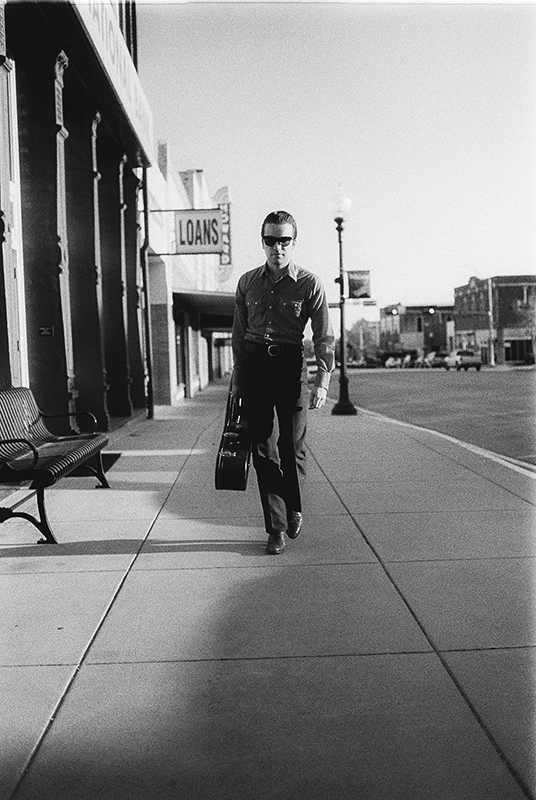
Para grabar “Chérie”, aparte de tu banda The Possums, ¿Qué músicos invitados están en el disco?
The Possums incluyen la formación oficial con Thibault Ripault a la guitarra, Olivier Viscat al bajo, Bastien Cabezon a la batería y Julien Bouyssou al piano y al órgano.
Para el álbum, invitamos a colaborar a Erik Hokkannen y John Schattenberg (violín) y Dave Biller (pedal steel). Dave también escribió los arreglos de cuerdas para «Liquor and Love», «Every Wish» y «How Do I Learn to Lose».
Estos tres músicos han sumado un valor invaluable al disco y creo que hemos aprendido mucho viéndolos trabajar. Nunca me acercaré a grabar de la misma manera después de reunirme con Erik. Es una fuerza de la naturaleza y está muy conectado con el verdadero espíritu de la llamada música ‘hillbilly’. ¡La toca de verdad, con todo su corazón y alma! De hecho, así es cómo se supone que siempre hay que tocar, pero hasta los mejores músicos tendemos a olvidarlo de vez en cuando… Creo que él no lo tiene en mente nunca, ¡simplemente no puede evitar prender fuego a las grabaciones!
¿Qué tal fue la experience de grabar en Kerwax studios en Brittany en Francia para grabar “The Kerwax singles collection” in 2022? ¿Qué diferencias hay entre tipo de estudios respecto con los que hay en Estados Unidos?
Kerwax es un gran estudio residencial en el corazón de Bretaña. El propietario, Christophe Chavanon, es un ingeniero con mucha maña y su equipo allí es una pasada: cientos de dispositivos antiguos de grabación analógicos, una hermosa sala de techos altos… es un ambiente muy agradable. Recomendaría a cualquiera que vaya allí.
En verdad, la sesión en Kerwax también ocurrió justo en mitad de COVID, por lo que puede que no fuera el momento más idóneo desde un punto de vista creativo. Se suponía que íbamos a hacer un álbum, pero finalmente grabamos una serie de sencillos… En 2022, parecía que todo sucediera de forma muy lenta y a veces me desanimé un poco con tanta cancelación. Supongo que forma parte del viaje. ¡La carrera de un músico no es una larga luna de miel!
Por otro lado, ese período también me dio mucho tiempo para practicar y escribir algo de material, para que cuando llegásemos a Fort Horton, estaríamos listos para grabar. Queríamos grabar un disco totalmente ‘country’, ya que estábamos inmersos en un ambiente que nos empujaría en esa dirección. Nos quedamos en Texas durante tres meses, sumergiéndonos por completo en nuestro trabajo y haciendo música todos los días y todas las noches. En mitad de todo eso, también sucedieron muchas cosas a nivel personal, por lo que «Chérie» fue y seguirá siendo muy diferente a cualquier otra grabación que hayamos hecho. Muchos momentos muy felices y tristes, combinados en un torbellino sin parar. En mi opinión, este disco se trata de mucho más que 12 pistas.
No sé si tiene que ver con el país en el que estás grabando. Creo que se trata más de encontrar el estudio y el productor adecuados para tu música, ¡lo que a veces significa una grabadora en un dormitorio y ningún productor! Para hacer la música que quiero hacer yo, resulta que lo mejor es hacerlo con alguien como Billy Horton. Siento que tenemos algo realmente especial con él y espero que podamos volver a hacerlo muy pronto.
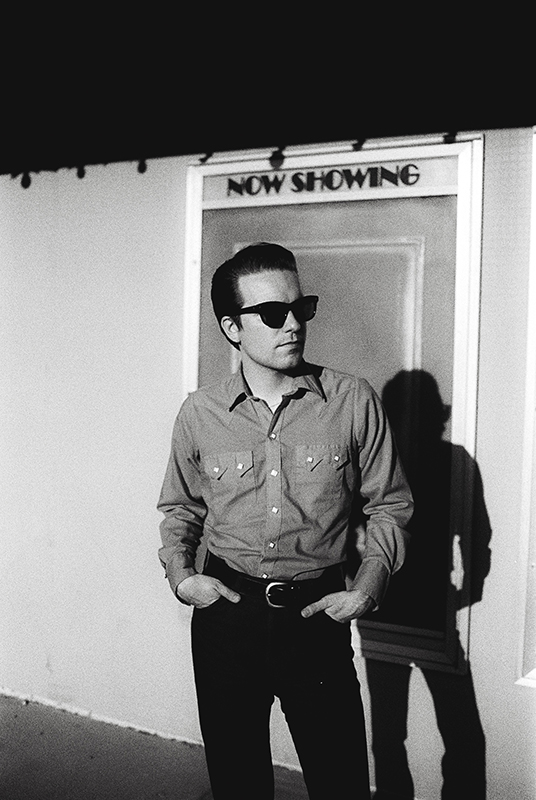
Tienes tu propio sello discográfico, Tomika Records, ¿tienes intención algún día de crear tu propio estudio de grabación o simplemente añadir referencias al mismo?
Tomika Records es el sello que cofundé con mi amiga y compañera, Leila. Y sí, tener tu propio estudio de grabación es el sueño. No puedo decir cuándo sucederá ni cómo, pero estoy haciendo todo lo que pueda para cumplir ese sueño. Sin embargo, no voy a dejar que ralentice mi ritmo de grabación. Seguiré escribiendo y grabando siempre cuando pueda, con la esperanza de que algún día pueda hacerlo todo yo solo. Mientras tanto, a por el siguiente.
¿Cuándo empezaste a tocar música? ¿Cómo fue tu primer concierto?
Monté mi primera banda con 11 años. Actuación públicamente por primera vez en mi colegio ese mismo año. Canté «Highway to Hell» y «Respect». ¡La pubertad aún no había llegado, así que podía llegar a esas notas! jaja
Mis estudios se empezaban a ir a pique a partir de ese momento.
¿Antes de sacar “Sauce Piquante” in 2019 qué hacías? Un año después de lanzar tu primer trabajo decidiste grabar “Plus the sauce” ya con con actual productor Billy Horton y con Emily Gimble. ¿Aquella primera toma de contacto fue simplemente cómo funcionaba o pensando ya en un futuro LP?
Antes de Sauce Piquante, yo estaba en otro grupo que se llamaba The Hearts. Supongo que estábamos ganando algo de momentum: tocamos en muchos sitios y salíamos mucho en la radio, pero la música no era exactamente lo mío. Sauce Piquante fue el primer paso en lo que llamo yo mi camino ‘¡Seamos más country!’. Mis queridos amigos Leila y Thibault me animaron a hacerlo, a no preocuparme demasiado por la opinión de los demás y a simplemente hacer lo que más me gusta. La parte más difícil de tocar ese tipo de música cuando habías nacido y crecido en Francia es no dejar que mucha gente te desanime, si sabes lo que quiero decir. Hace falta ser muy terco.
Cuando grabamos «We Shouldn’t Talk About it», fue cuando me di cuenta que no quería solo un disco, ¡sino 8! en Fort Horton. Hasta entonces, solo habíamos grabado en el mismo estudio una o dos veces porque buscábamos un ambiente perfecto para nosotros. Con Billy, hemos encontrado al tipo adecuado para profundizar más y, con suerte, para alcanzar nuevos niveles de maestría en nuestras grabaciones.
Si tuvieras que nombrar algunos artistas influyentes que te hayan inspirado, ¿Quiénes serían? . . y ¿Qué es lo que te inspira tanto de ellos?
Cuando era joven, leí muchas revistas con entrevistas de Jack White. Siento que me ha inspirado mucho, no tanto por su música, sino por su ética de trabajo. Fue una especie de profesor de filosofía musical para mí.
En cuanto a lo musical, la lista es demasiado larga, pero si tuviera que nombrar algunos artistas, diría Elvis, por un lado, porque me hizo ver que se puede combinar diferentes estilos de música en una sola canción. Por otro, Hank Williams, porque, cuando escribo, todos los días aprendo cosas nuevas gracias a él.
Y luego, hay personas que he conocido personalmente o con las que he trabajado. El rockero francés Don Cavalli me adentró en el mundo del bluegrass; algo que me flipa desde entonces. Mark Neill ha sido una influencia enorme en cuanto a mi forma de trabajar en el estudio e hizo que me planteara nuevos estándares de grabación. Más recientemente, creo que Chris Scruggs me ha impactado muchísimo en muchos sentidos: su forma de tocar la guitarra acústica, su dedicación, su pasión absoluta por la música y su amabilidad hacia los demás…
Y mi inspiración más grande – mis amigos. Porque ellos son los que me recomiendan música nueva y me apoyan en los momentos malos. Creo que podrías llamar a eso inspiración también.
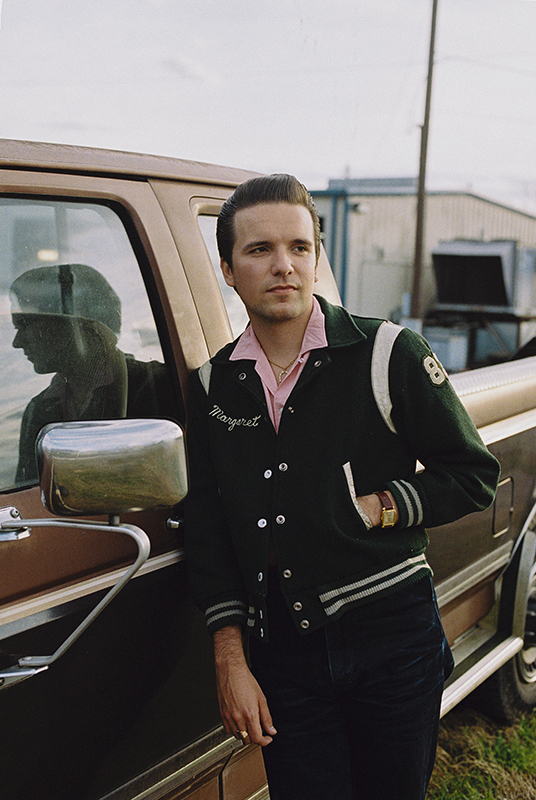
¿Recuerdas el primer disco que compraste? Y el primero que realmente te impresionó…
El primer disco que compré fue en Crocodisc, en París: una edición italiana de «Have a Rave Up» de los Yardbirds. 25 euros era mucho dinero para un niño de 14 años, ¡así que no lo olvidaré nunca!
El primer disco realmente grande para mí fue «Disraeli Gears» de Cream. Estaba obsesionado con la portada y el tono de guitarra que Clapton llamaba ‘the woman tone’ («el tono de mujer»). ¡Vaya viaje!
¿Hay alguna grabación o disco que estés buscando como loco? Tu “Santo Grial” por así decirlo… ¿Tu último gran descubrimiento?
Me encanta cuando encuentro algún disco raro del country que nunca antes había visto en una tienda de discos. Si tiene una pinta más tradicional, rara o antigua, ¡lo quiero! Si son discos de Decca de los años 60, los compraré pase lo que pase, porque siempre contará con la participación de mis músicos favoritos y el productor Owen Bradley. Any Folkways, Nashboro, Starday, Goldband, Arhoolie Records…
No sé si tengo en mente un disco tipo ‘santo grial’, pero seguro que me encantaría encontrar una 78 original de «Mule Skinner Blues» de Bill Monroe… En realidad, cualquier álbum de la vieja escuela de bluegrass me atraería.
¿Un Burdeos, un Rioja o una root beer, cassoulet, paella o enchiladas? ¿Austin, Nashville o París?
Un poco de vino de Burdeos, con paella (si es buena), y ¡en Austin! Espera, eso no tiene ningún sentido…
¿Qué tiene Texas que no tenga ningún otro estado o lugar en su país?
Margaritas muy grandes, grandes escenarios honky tonk de madera y la sala Sam’s Town Point. (De hecho, todo eso lo tiene Sam’s Town Point.)
Levantarse temprano para dar un paseo, desayunar y tomar un café en una ciudad que nunca antes había visto.
Si pudieras pensar en un “año” perfecto, ¿Cuánto dedicarías a escribir, grabar, hacer giras o descansar? ¿Eres capaz de tomarte un tiempo libre solo para ti?
Un año perfecto sería dedicarme principalmente a grabar – tal vez una vez al mes. Entre sesiones, estaría de gira con la banda, viajando en un gran autobús que lleva el nombre de mi último exitazo pintado en letras grandes. De vez en cuando, y solo si me lo merezco después de habérmelo currado lo suficiente, me relajaría en el jardín detrás de mi casa con los míos, junto a una piscina con forma de guitarra. Últimamente no paro a tomarme un descanso porque creo que es demasiado pronto para relajarme. Sin embargo, creo que es importante descansar un poco cuando puedas, porque es cuando te vienen las buenas ideas.
¿Qué papel jugó la música en tu vida, particularmente cuando eras un niño?
Ha sido el motor de toda mi vida desde que tengo memoria. Me dio un propósito y es la razón por la que me levanto por las mañanas. También es un desafío constante que me hace perseverar, porque siempre me pregunto si puedo escribir una canción mejor que la última. A veces es un juego divertido, y otras, puede convertirse en una pesadilla porque eres como un esclavo de la música… No sé, creo que siempre ha sido mi misión.
¿Qué será lo siguiente? ¿Cuáles son tus planes?
Después de la gira esta primavera, quiero intentar grabar yo solo un álbum de guitarra y voz, en mi sótano, con un micrófono, y en solo uno o dos días. Si no sale bien, espero hacer otro disco con la banda en otoño. Mi objetivo número uno es salir de Francia, a ver cómo me las apaño. Mientras tanto, estaré escribiendo canciones y tocando mi banjo.
Muchísimas gracias Theo por sus respuestas. ¿Hay algo que quieras decirnos que no te hayamos preguntado y te importaría enviar un mensaje a los lectores de Dirty Rock y animarlos a verte en esta gira española?
Ha sido un placer. Una cosa que puedo decir es que no es fácil encontrar a cinco jóvenes franceses que vayan a tu ciudad tocando música country que te haga bailar un Texas-two-step toda la noche, así que… ¡no te lo pierdas!
Entrevista realizada por Carlos Pérez Báez y Jessica Jacobsen.
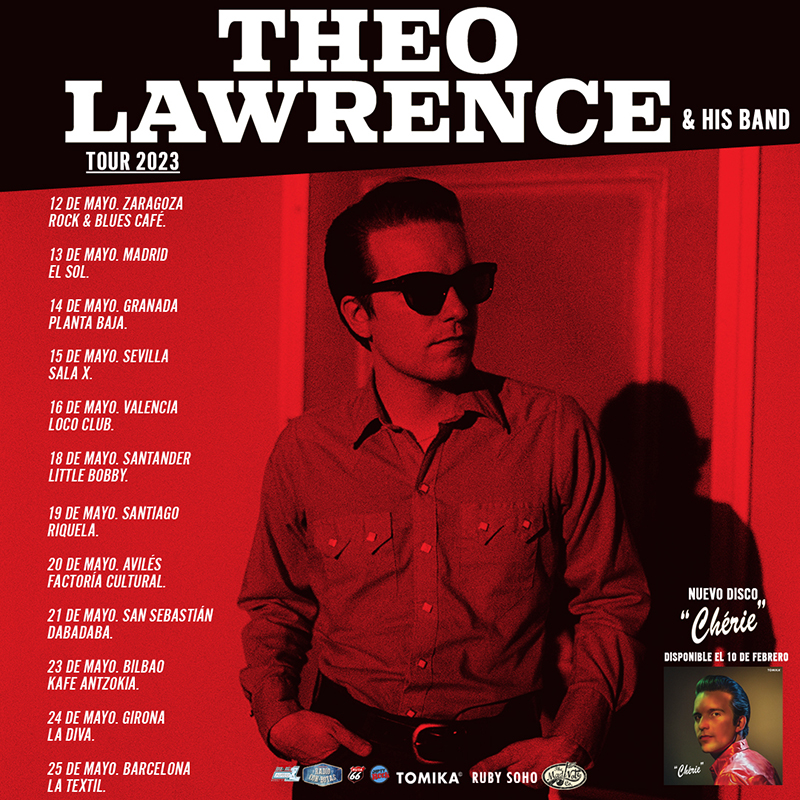
Interview with Theo Lawrence:
Hi Theo, ! I don’t know where to begin with this interview, considering your colorful new music, but I suppose the logical first question is how are you, ready for a new tour in Spain with a dozen concerts in May?
I’m not only ready, I’ve been eagerly waiting for the upcoming Spanish tour! Cowboy Jack Clement once said « We’re in the Fun business, if you’re not having fun, you’re doing it wrong ». Well let me tell you, we’re about to do it right haha! I’ve been missing touring with the full band a lot this past year. This tour officially means we’re back on tracks, doing what we do and love the best.
On your very first Spanish tour back in November-December 2021, your live show really made some heads turn. Then you held a surprise live gig in the Plaza de la Vírgen Blanca in Vitoria for the Azkena Rock Festival after Kim Lenz canceled due to covid. What do you remember about that tour and concerts, what did you like the most?
The whole Spanish experience has been filled with great and unforgettable memories so far. Traveling with my best friends through beautiful landscapes all across the country, playing the music we love in front of very supportive new fans… I mean, how can this possibly go wrong? And to be honest, this is true in every country, but just way more in Spain!
I have special memories of Granada. The Alhambra in the afternoon, playing pool in crowded Rock n’ Roll bars at night. Also a really old restaurant in Santander where people were pouring cider on the floor because they were raising their bottles so high, they kept missing the glass. It just seemed to me like one big party because most every night, people from the audience also went to have a drink with us after the shows. It created this very joyful trip and I cannot wait to do it again!
Can you run us through some more of the tracks on there you like? Are you happy with the final result of “Chérie”, your latest album released last February? Why did you use “Chérie” for the title?
Yes this record is what I’m most proud of so far. Because it’s never sounded so close to the music I actually listen to at home. I don’t really care about putting out music if it doesn’t actually have the same characteristics as what I like from other people’s art. There’s many ways you can achieve this, and it starts from writing the song, to arranging it and finally recording it. But there’s also many ways you can fuck this up haha! Which is basically every step of the way. I feel like on this record we’ve done a good job at not messing up. « Chérie » was one of my favorite tracks on the record, and I just wanted to slightly hint I had something French about me. Even though I’m trying my best to hide it most of the time haha! Which is why I chose it as a title. A few other favorites would be California Poppy, The Universe is Winding Down, Liquor and Love, How Do I Learn To Lose and I’ve Been Here Too Long.
I’ve been completely fascinated by Country music these past few years and for a long time, the country-er my music got, the more people were trying to hold me back because they said it would sound too « this » or « that ». I feel like this last album and the upcoming EP « Country Mile » (coming out for Record Store Day 2023) is sending a message clear enough that this is what I’m doing, for people to encourage me to keep on doing what I love.
Another reason this album is special to me is because it’s the first one we were entirely responsible of from start to finish. This is a fully independent release by Tomika Records, which means I recorded what I wanted and put it out the way I pleased, without asking Big Brother if he was O.K with it. It might be a Nashville sounding old-school Country Music record, it was done in a very DIY punk rock way!
Let’s talk about the producer Billy Horton and his studio, Fort Horton in Wyldwood, Texas. Tell me how his collaboration on “Chérie” came about, after working with legends as Nick Curran, Jimmie Vaughan, James Cotton, Deke Dickerson or Kim Lenz, Charley Crockett and Nick Waterhouse, among others?
We met in Austin through my good friend Tjarko Jeen. He just introduced me to Billy, saying « Hey Billy’s got a studio, I think you’ll like it ». A few days later we were at his studio to cut a song with Emily Gimble called « We Shouldn’t Talk About It ». We liked the experience a lot, but had to wait a couple years because of Covid before we were able to go back and do a full record.
I didn’t really know it a the time, but Billy Horton is a very important figure in the Austin recording world. He’s done so many fantastic albums for local bands and players. He’s the Owen Bradley or Texas, no doubt about that.
You’re a sucker for analogue, which has led to some sound and style reminscent of 50s-60s teen glam pop from the Brill Building, Nashville country, zydeco and other hot sauces. What do you look for in a studio when recording songs?
That is true! I never approach a session thinking « Let’s do a tribute to the Brill Building, or the Nashville Sound », we usually try to do what the song calls for. In my mind the frontiers between all these styles are very thin. Just the way you pronounce a word can make it sound like a certain style. Country stars made hits out Jazz and Pop songs and Vice Versa, because in American popular music, it all comes down to a serie of words, placed in a particular order, on top of a combination of notes. The foundation I rely on, is a good line with the right chords, presented with a phrasing that fits. Then I ask myself « Does it sound like something I’d listen to? Does it hold the attributes of a solid song? ». If it does, let’s cut it, and then « style » is just seasoning with salt and pepper. Even if producers hate that word, what I’m looking for in recorded material is a « vibe ». I want the music to enhance reality and give me the illusion I’m living in a movie or a book. Reverb helps me with that sometimes haha!
To record “Chérie”, apart from your band The Possums, which guest musicians are on the record?
The Possums are the official line up featuring Thibault Ripault on guitar, Olivier Viscat on bass, Bastien Cabezon on drums and Julien Bouyssou on piano and organ.
On the album, the guests are Erik Hokkannen on fiddle, Dave Biller on pedal Steel and John Schattenberg on violin. Dave Biller also wrote the string arrangements for Liquor and Love, Every Wish and How Do I Learn to Lose.
These 3 musicians have added an invaluable value to the record and I think we’ve learned a lot from watching them at work. I will never approach recording the same after meeting with Erik. He’s such a force of nature and he is so connected to the true spirit of Hillbilly Music. He plays that stuff for real, with all of his heart and soul! Which is the only way it’s supposed to be played, but even the best of us tend to forget that here and there… I think he doesn’t even have to remember, he can’t help setting recordings on fire!
What was the experience of recording “The Kerwax singles collection” in 2022 at Kerwax studios in Brittany in France like? What differences are there between that type of studio compared to those in the United States? What do they have that we don’t have or vice versa?
Kerwax is a great residential studio in the heart of Brittany. The owner Christophe Chavanon is a very skilled engineer and the collection of gear there is just insane. Hundreds of analog recording devices from the past, a beautiful high ceiling room, a very friendly atmosphere… I would recommend anyone to go there.
To be honest the session at Kerwax was also right in the middle of Covid, so it might not have been to most fulfilling time from a creative standpoint. We were supposed to do an album, which turned into a series of singles… Things felt slow, and I was little discouraged at times in 2022, with all the shows that kept on being cancelled. I guess it’s part of the journey. A career in music is not one long honeymoon!
On the other hand that whole period also gave me a lot of time to practice and write some songs, so when going to Fort Horton, we were ready to roll. We wanted to record a full on Country record, surrounded by an environment that would push us in that direction. We stayed in Texas for 3 months, completely immersing ourselves and making music all day and all night. In the midst of all that, a lot of stuff happened on a personal level too, so the making of « Chérie » was and will remain unlike any other recordings we’ll ever do. A lot of very happy and sad moments all combined in a non stop whirlwind. In my mind, it’s so much more than 12 tracks on a record.
I don’t know if has to do with the country you’re recording in. I think it’s more about finding the right studio and producer for your music, which sometimes means a tape machine in a bedroom and no producer! For the music I want to make, turns out it’s best for us to do it with someone like Billy Horton. I feel like we have a really good thing going on with him and I hope we’ll get to do it again very soon.
You have your own record label, Tomika Records. Do you intend to one day put together your own recording studio or just add references to it?
Tomika Records is the label I’ve co-founded with my friend and partner Leila. Oh yes, a recording studio is this is the ultimate goal. Can’t tell you when this will happen and how, but I’m doing every thing in my power to make it happen. I’m not gonna let it slow down my recording pace though. I’ll keep on writing and recording as constantly as possible, just hoping that someday I can do it all by myself. In the meantime, on to the to the next one.
When did you first start playing music? What was your first gig like?
I started my first band around in the age of 11.
My first public appearance was at a show in my school that very same year. I sang « Highway To Hell » and « Respect ». Puberty hadn’t hit yet, so I could hit those notes haha! My studies went downhill from there.
Before releasing “Sauce Piquante” in 2019, what were you doing? A year after releasing your first album, you decided to record “Plus the sauce” with your current producer Billy Horton and Emily Gimble. Was that first contact just how it turned out or were you already thinking about a future LP?
Before Sauce Piquante, I was in another and called The Hearts. I guess we had a momentum going, playing a lot of shows and we had good radio airplay but the music was not what I had in mind. « Sauce Piquante » was the first step of me going « Let’s get Country !». My very good friends Leila and Thibault encouraged me to do so, not mind about other people’s opinion too much and just do what I love. The hardest part of playing that kind of music when you’re born and raised in France, is not letting too many people bring you down if you know what I mean. It takes a lot of stubbornness.
When we recorded « We Shouldn’t Talk About it » was when I thought I don’t wanna just one, but 8 records at Fort Horton! Because so far we’ve only been recording in studios once or twice, looking for the right environment for us. With Billy, we’ve found the right guy to get more in depth and hopefully reach new levels of recording artistry.
If you had to name some influential artists who have inspired you, who would they be . . . and what is it about them that inspires you so much?
When I was young I read a lot of Jack White interviews in magazines. I feel like he’s inspired me a lot, not so much because of his music but mostly because of his work ethic. He was a music philosophy teacher to me.
Music wise, the list is just too long to go through, but if I had to pick a few names I would say Elvis because he showed me you could combine different styles of music within one song. Hank Williams, because I still learn from him everyday when it comes to writing songs.
And then people I’ve personally met or worked with. French rocker Don Cavalli, introduced me to Bluegrass, which I’ve been high on ever since. Mark Neill tremendously influenced my ways in the studio and set new recording standards for me. More recently, I think Chris Scruggs had a huge impact on me in many ways. His acoustic guitar playing, his dedication, absolute passion for music and kindness to others!
Most importantly, my close friends. Because they’re the ones who play me new music, and support me in times of troubles. I think you could call that inspiration.
Do you remember the first record you bought ? And the first one that really impressed you…
The first record I bought was an italian pressing of « Have a Rave Up » by the Yardbirds at Crocodisc in Paris. 25 euros was a lot of money for a 14 year old so I won’t forget that one! The first one that was really big for me was Disraeli Gears by Cream. I was obsessed by the cover and the guitar tone Clapton called « the woman tone ». Tripy!
Are there any albums that you would especially like to add to your collection? A kind of “Holy Grail” for you… Your latest greatest discovery?
I get really excited when I come across a rare country record I’ve never seen before in a record store. If it looks like traditional, weird or old, I’m interested! If it’s a 60’s Decca records, I’ll buy it no matter what because it will feature my favorite musicians and producer Owen Bradley.
Any Folkways, Nashboro, Starday, Goldband, Arhoolie records…
I don’t know if there’s a « Holy Grail » record I’m looking for but I sure would love to find an original 78rpm copy of Bill Monroe’s « Mule Skinner Blues” maybe? Honestly any old bluegrass record will my head turn.
Bordeaux, Rioja wine or root beer? Cassoulet, paella or enchiladas? Austin, Nashville or Paris?
Some Bordeaux wine, with paella (if it’s good), in Austin! Wait, it doesn’t make any sense…
What does Texas have that no other state or place in your country has?
Very large margaritas, big honky-tonk hardwood floors and Sam’s Town Point. Which can all be found at Sam’s Town Point.
What’s your favorite thing about touring?
Waking up early to have a walk in a city I’ve never seen before, have a walk, get some breakfast and coffee.
If you could come up with a perfect “year,” how much of it would you devote to writing, recording, touring or down time? Are you even able to take any time off just for yourself?
A perfect year would be mostly spent recording, maybe once a month. In between sessions I’d be touring with the band, traveling in a big bus with the name of my last hit record painted on the side in large letters. From time to time, only if I deserve it because I’ve worked hard enough, I would chill in my backyard with my loved ones, by a guitar-shaped swimming pool. I haven’t been able to take some time off lately because I think it’s too soon to chill! I think it’s important to take some to rest when you can though, because that’s when you get good ideas.
What role did music play in your life, particularly as a kid?
It has structured my whole life as long as I can remember. It gave me a purpose and it’s the reason why I get up in the morning. It’s also a constant challenge that’s keeps me going, because I’m always wondering if I can write a better song that the last one. Sometimes it’s a fun game to play, sometimes it can also turn into a nightmare because you’re like a slave to the music… I don’t know, I think it’s always been my mission.
So what’s next? What are your plans comin’ up?
After the spring tour, I want to try to record a guitar and vocals album by myself, in my basement, with one microphone, in one or two days. If it doesn’t turn out good, we’ll make another record with the band in the fall I hope. My number one plan is to get out of France, if I manage. In the meantime, I’ll be writing songs and playing my banjo!
Thank you very much for your answers. Is There anything you want to tell us that we didn’t ask you and lastly, would you mind sending Dirty Rock readers a message to encourage them to see you in this Spanish tour?
My pleasure. One thing I can say is, it’s not often that 5 young french guys playing Country Music will come to you town and make you Texas two-step all night so… don’t miss it!
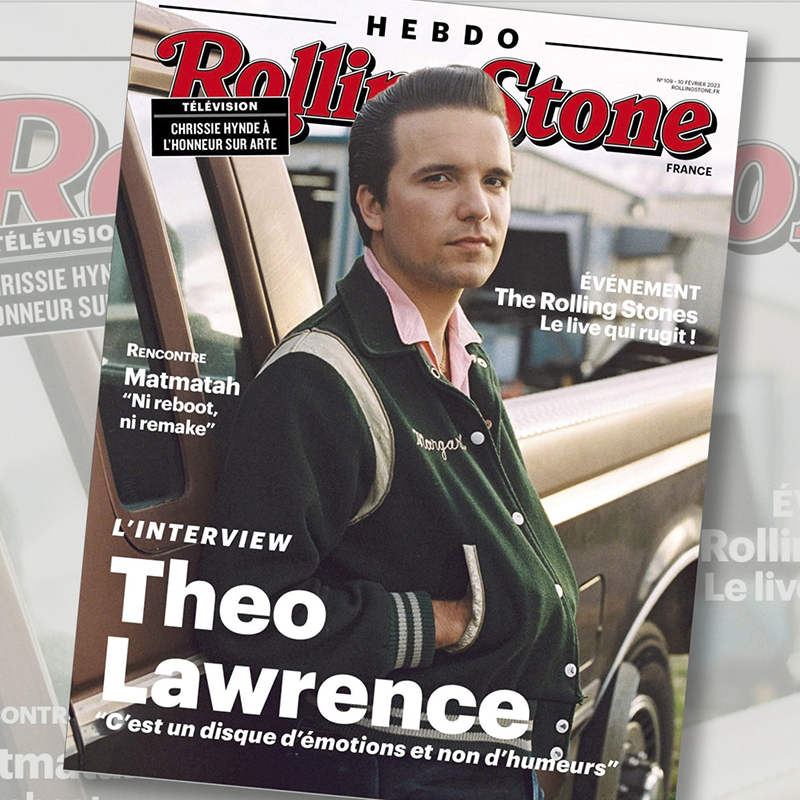
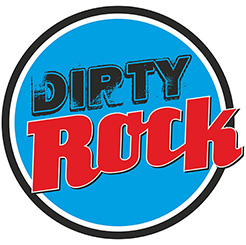
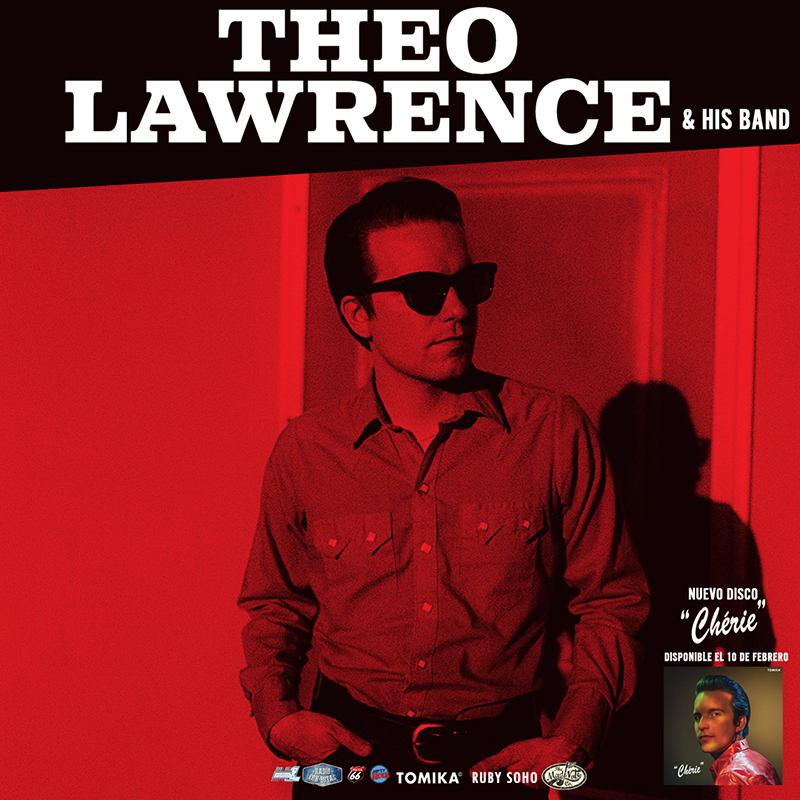
1 Comentario